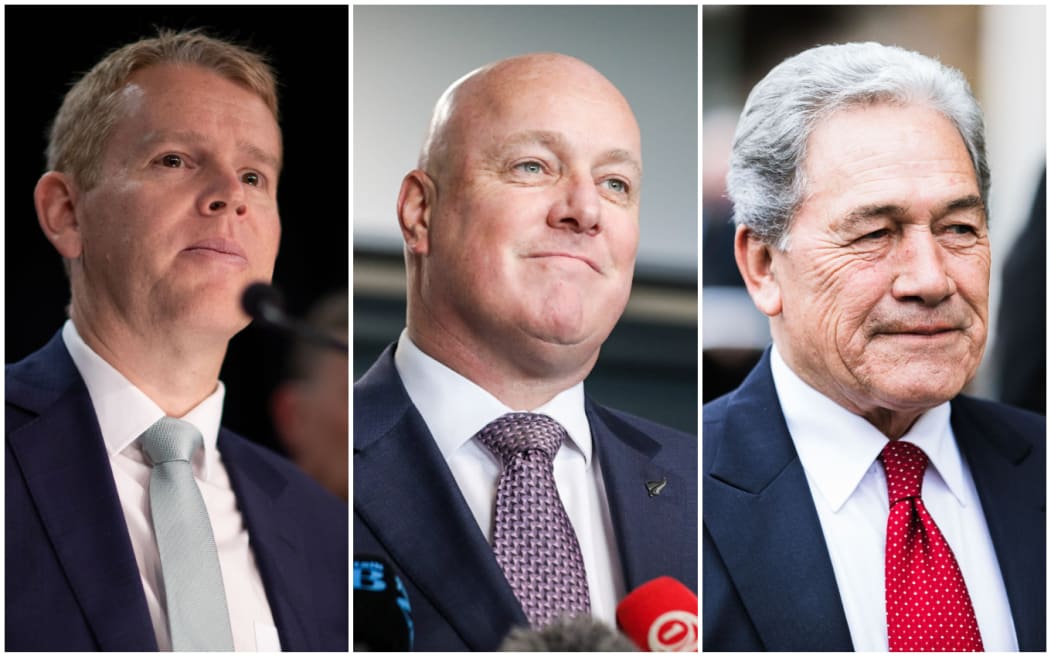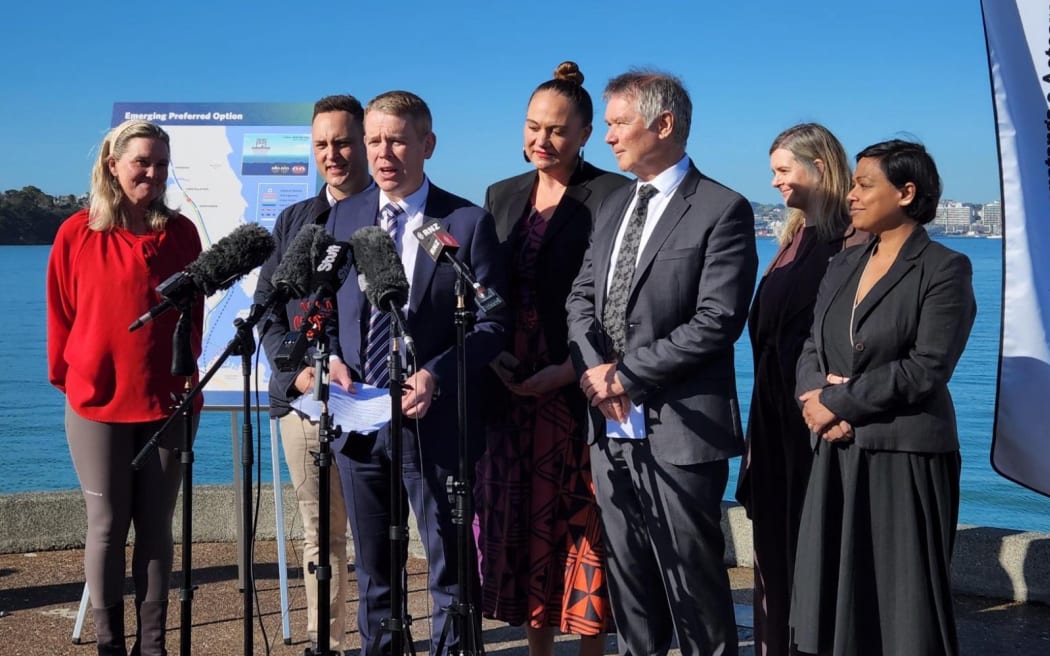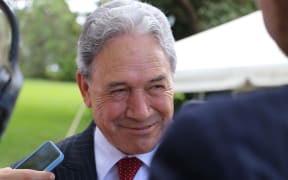
Labour Party leader Chris Hipkins, National Party leader Christopher Luxon and New Zealand First leader Winston Peters. Photo: RNZ
Analysis - An ambitious and vastly expensive tunnel proposal for Auckland Harbour, a $2 billion international fund for New Zealand's renewable energy projects, the latest poll shows NZ First with enough support to get back into Parliament and the hottest topic of the week: National's policy to ban cellphones in schools.
It was a simple announcement by National Party leader Christopher Luxon that created the most controversy this week.
"National will ban cellphone use at school to help lift achievement," he said in a statement.
"The ban applies to all schools. Schools will be able to decide exactly how they enforce it."
After releasing the statement Luxon told Morning Report the ban was one of the ways National would lift "abysmal" achievement levels - official figures have shown 15 percent of school leavers in the past year did not have any NCEA qualifications.
"What we're hearing from parents and teachers and what we're seeing in the research is that phones are incredibly distracting and disturbing and they are getting in the way of student achievement," he said.
After that it wasn't so simple.
Principals say National's plan to ban phones in schools is unworkable was one headline on RNZ's website.
Secondary Principals' Association president and principal of Papatoetoe High School, Vaughan Couillault, believed the ban wasn't necessary and he didn't think having the government controlling it was the way to go.
"It will create conflict, it will create a legal requirement for us to confiscate rather than to educate and train students on how to use things appropriately," he said.
Couillault thought the practicalities of taking phones off students en masse was "just not worth thinking about".
Luxon dismissed his concerns. "This is not rocket science… if a school principal can't work out how to actually comply and enforce with the programme, there'll be some other issue going on in that school."
Luxon said the ban would be implemented with a simple regulation under the Education Act and monitored through the Education Review Office.
Other media outlets sought a wide range of opinion.
Education Minister Jan Tinetti, a former school principal, also said the ban was unnecessary. She believed it showed National misunderstood how schools operated.
"Schools can ban cellphones if they believe this is appropriate and I understand that many already do," she said.
The Herald reported a number of schools, including Diocesan School for Girls, Otago Boys' High School, Ashburton College and Rotorua Intermediate already had cellphone bans in place.
Diocesan School for Girls principal Heather McRae said the ban had been in place since 2019 for all students up to the end of year 10, and there had been a big improvement in the amount of physical activity and social skills.
"You know, they actually talk to their friends and do cartwheels on the lawn and you see a whole kind of liberation," she said.
The ban didn't extend to senior students because they were of an age to learn responsible behaviours and how to moderate their usage.
Otago Boys' High School rector Richard Hall said cellphones had been banned since 2022 and it was "one of the best things I've done".
Hall said he had seen changes since the ban was implemented and it was now normal to see boys interacting and playing together during breaks. Staff were also spending a lot less time dealing with cyber bullying.
The Herald found several other schools which had implemented bans.
One principal said parental support was not unanimous to start but most were grateful for the policy because they were concerned about their child's screen time.
Stuff did one of its Yes/No website polls and on Friday morning 22,852 readers had responded. The count was 68 percent in favour with 32 percent opposed.
Luxon insisted the policy wasn't political or ideological but National will be interested in the public reaction. It has very likely carried out its own private polling.
The ban is easy for a government to put in place so it will probably be one of the first things National does if it wins the election.

Chris Hipkins, David Parker and Carmel Sepuloni at the announcement of Labour's Auckland transport plan on 6 August. Photo: Lucy Xia / RNZ
Education wasn't on the government's agenda this week, it was transport and energy.
Prime Minister Chris Hipkins began by announcing the government's chosen option for a second Auckland Harbour crossing was three tunnels - two with three lanes for vehicles and one for light rail.
The cost was a staggering $35 billion to $44.5 billion, with construction starting in 2029.
"These new tunnels future-proof the city's transport network by reducing reliance on the Harbour Bridge while creating fast new options for getting in and out of the city," Hipkins said.
"For decades we've heard about false starts, vested interests, political stalemates, a lack of vision and a lack of will. It's time to stop that talk… we need to move into action mode."
It's a hugely ambitious project which will take decades to build, and ran into its first problem when Auckland Mayor Wayne Brown accused Labour and National - which said it was "supportive of more vehicle lanes" - of putting politics above transport, the Herald reported.
Brown said the council was "looking forward to working on some better, faster and cheaper plans".
"Both major parties need to realise that their big transport plans won't happen unless they work in partnership with Auckland, and that's not what has happened here," he said.
The Herald published an editorial pointing out some obvious difficulties: "There are questions about cost-effectiveness. It is very long-term, taking decades to complete. The entire project or parts of it could be kicked aside by a different government before it gets underway."
The paper said Labour's plan appeared to be "a major play for the biggest pool of voters, but it's a huge amount of money to spend on a project mainly benefiting North Shore residents".
The Greens didn't support it, with co-leader James Shaw saying the tunnels weren't the best way to address congestion.
"Frankly, during the climate crisis it's a bit bonkers to be building more roads," he said.
Herald columnist Simon Wilson may have captured the public mood in an article titled 'Labour and Nats are transport fantasists'.
"Both parties intend to spend many tens of billions of dollars on these plans, over several decades," he said.
"They are fantasists, the pair of them. We have urgent transport problems that need addressing now… they both promise the moon, much later."
After making this announcement, Hipkins switched to renewable energy.
At his post-cabinet press conference he announced three wind farm projects were being fast-tracked for consenting, part of nine projects that were in the pipeline.
Fast tracking would cut about 18 months off the consenting process, and it had become a key part of the government's strategy to accelerate economic recovery post-Covid, he said.
"What is actually new in what you're announcing?" he was asked. He replied that the projects were being speeded up.
Hipkins had a lot to say about renewable energy and its environmental benefits
What he was doing, it became apparent later, was laying the groundwork for another big announcement - a "first-of-its-kind" $2 billion climate infrastructure fund.
The fund is being launched by BlackRock, one of the world's biggest investment companies, and the aim was to make New Zealand the first country in the world to reach 100 percent renewable energy, RNZ reported.
The head of BlackRock Australasia, Andrew Landman, said it was the first time it had done a country-specific initiative like this one.
"We've benefited over the last 10 years managing various retirement savings for New Zealand and I think through that engagement we've learned so much about the innovation in New Zealand and the institutional investors here… (they are) are global leaders."
Economist Bernard Hickey explained how the BlackRock investment works, you can listen to it on RNZ's website.
The BlackRock deal was generally welcomed, and National didn't have a problem with international financing of projects.
ACT leader David Seymour was the outlier. Working towards 100 percent renewable electricity was a "dumb idea" which would push power prices up for little environmental gain, he said.
After last week naming a National/ACT post-election cabinet, the Herald's Audrey Young has had a crack at a Labour/Greens/Te Pāti Māori lineup.
The Greens would want a full coalition agreement, so Labour's cabinet would have to shrink with some MPs moving down and some out altogether.
Young thought it was almost certain that five or six existing ministers would announce their retirement during the next term, and that would give Hipkins the chance to add new ones.
Her picks for retiring ministers were Grant Robertson, Kelvin Davis, Damien O'Connor, David Parker and Nanaia Mahuta.
So the renewal in any Labour/Greens cabinet would initially be provided by the Greens, and then by Labour part-way through the term.
Two ministers, Michael Wood and Kiri Allan, have resigned and not been replaced, which helps make room for the Greens.
They would have three ministers in cabinet - James Shaw with climate change, Marama Davidson with conservation, prevention of family and sexual violence and associate housing (homelessness) and Chloe Swarbrick holding mental health and associate local government (climate adaptation).
Outside cabinet there would be Julie Anne Genter with associate transport and women, Teanau Tuiono with oceans and fisheries and associate agriculture, and Golriz Gharaman holding disability, associate justice and associate immigration.
Young said though Te Pāti Māori would stay out of a coalition, giving Labour support on confidence and supply only. She thought it "highly unlikely" they would want ministerial portfolios.
The week ended with a Taxpayers Union-Curia poll showing NZ First climbing to 5.8 percent, enough to return to Parliament with seven seats.
The poll continued the trend of National and ACT having sufficient support to form a government if an election was held now, but they would only just make it.
It was bad news for Labour. The party dropped four points to 27.1 percent, slipping below 30 percent for the first time.
National didn't gain much from Labour's fall, going up 1.6 points to reach 34.9 percent.
Most of it went to the Greens, up 3.1 points to 12 percent, with the poll showing the party catching up to ACT which was on 13 percent.
Previous polls have shown NZ First slowly gathering support but this was the first one to put it firmly over 5 percent.
A Roy Morgan poll last week had it on 5 percent, and that was the first time NZ First had reached the threshold.
The next set of polls released by TVNZ and Newshub will be important because they will show whether NZ First's gain and Labour's slump are a trend that's firming up.
*Peter Wilson is a life member of Parliament's press gallery, 22 years as NZPA's political editor and seven as parliamentary bureau chief for NZ Newswire.






